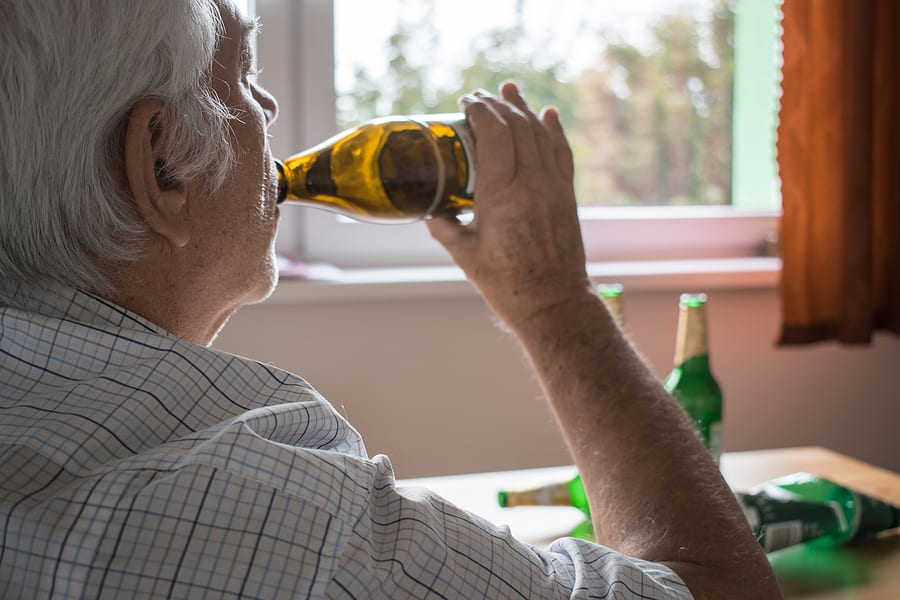Substance abuse is a problem that plagues many families in America. For senior citizens, it can be especially difficult to identify and combat. Seniors may turn to abusing drugs or alcohol for several reasons. Unfortunately, many of the signs of substance abuse can also be a common factor of aging. This article will explore common substances abused by elderly individuals. Then, this article will discuss common signs of substance abuse, and how to better identify the issue at hand.
Common Sources of Substance Abuse
Alcohol Abuse
Alcohol abuse can be rampant at any age but can be especially deadly for elderly individuals. Because many people start drinking at an early age, alcohol abuse can come from repeatedly pushing past established tolerance. Alcohol dependence can grow over time. Those who drank socially throughout their adulthood are more susceptible to developing alcohol dependency as a senior.
Opioids
Opioid addiction and abuse are becoming increasingly more widespread in America, across all age groups. Opioids are powerful painkillers, often prescribed after serious surgeries or procedures. Addiction often stems from being prescribed opioid drugs, then and seeking more from there. Oxycodone, Percocet, Fentanyl, Hydrocodone, and Morphine are all commonly prescribed opioids.
Anti-Anxiety Medications
Anti-anxiety medication abuse generally stems from overuse and dependence on prescription anti-anxiety pills. Ativan, Klonopin, Valium, and Xanax are the most common forms of anti-anxiety medications. These pills can usually be prescribed by a primary care physician.
Common Signs of Substance Abuse
There are many signs of substance abuse. However, many of these signs can also be factors of old age; or even side effects of medication. This is why substance abuse can be difficult to identify in elderly individuals. Talk to your loved one’s physician if you believe there may be a substance abuse issue.
“Misplacing” Prescriptions
Prescription drug abuse is often fueled by patients “losing” their prescriptions. If your loved one seems to be losing their medications and having to pick up more, there may be cause for concern.
Mood Changes
Drastic changes in mood and overall demeanor can be a sign of substance abuse. If your loved one is suddenly more irritable when they are usually happy, or vice-versa, they may be abusing drugs or alcohol.
Sleeping More and Nodding Off
Those dealing with substance abuse will usually sleep drastically more than before their abuse began. As such, it can be a common sign of alcohol or drug dependence. Additionally, it is common for substance abusers to nod off in the middle of conversations or activities.
Confusion and Memory Loss
While memory loss and confusion can be a sign of mental illness or deterioration, it can also be a common sign of substance abuse. Your loved one’s physician should be referred to in regards to cases of memory loss and confusion. They will be more equipped to identify whether or not this is due to a mental issue, or if substances are involved.
Wanting or Preferring Isolation
Many elderly individuals suffer from feeling lonely or isolated. Preferring to be left alone, or withdrawing from social situations can be a sign of substance abuse. It is important to not mistake wanting independence for wanting to be isolated. Many elderly individuals feel like their independence is threatened as they require more assistance with age.
Lying About Simple Matters
Lying is common in those trying to hide the addiction. This may involve creating false stories or lying about seemingly innocent events. If your loved one is consistently lying about small things, there may be something bigger at hand.
Big Changes in Appearance and Upkeep
It is common for elderly individuals to spend less time keeping up their appearance. However, for those suffering from substance addiction, these changes can be drastic and sudden. If your loved one is disheveled, smells poorly, and is not taking care of themselves, you may want to pay attention to their consumption habits.
Smelling of Alcohol
Smelling of alcohol, or having alcohol on their breath is a common sign of alcohol use. It is important to note the difference between light or social drinking, versus alcohol dependence. Smelling of alcohol often, or at inappropriate times, might be a sign of abuse.
Helping Your Loved One with their Substance Abuse Issue
If you believe your loved one has a substance abuse issue, discuss with their physician and your family possible ways to handle the situation. There are many resources available to families that want to help their loved ones overcome addiction and chemical dependency. Consider discussing the issue with the individual. They may be willing to work with you to stop their substance abuse.
Safe Harbor Healthcare Services does not provide medical or healthcare advice via articles. This material has been prepared for informational purposes only, and is not intended to provide, and should not be relied on for medical advice.
Safe Harbor Healthcare Services has been providing excellent home care on Staten Island since 1967. Our services help the elderly and disabled live safely and independently; while giving their families the peace of mind they need. For more information, contact Safe Harbor by clicking here, or call us at (718)-979-6900.

